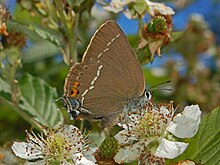Satyrium spini
| Blue spot hairstreak | |
|---|---|

| |
| Satyrium spini, underside | |
| Scientific classification | |
| Domain: | Eukaryota |
| Kingdom: | Animalia |
| Phylum: | Arthropoda |
| Class: | Insecta |
| Order: | Lepidoptera |
| Family: | Lycaenidae |
| Genus: | Satyrium |
| Species: | S. spini
|
| Binomial name | |
| Satyrium spini (Schiffermüller, 1775)
| |
| Synonyms | |
| |
Satyrium spini, the blue spot hairstreak, is a butterfly in the family Lycaenidae.[1]
Subspecies
Subspecies include:[1]
- Satyrium spini spini – (Southern and Central Europe)
- Satyrium spini melantho (Klug, 1834) – (Caucasus, Armenia, Talysh Mountains, Kopet-Dagh)
Distribution
The blue spot hairstreak lives in southern and middle Europe (Portugal, Spain, France, Italy, Switzerland, Austria, Germany, Poland, Hungary, Croatia, Greece, Turkey) up to approximately 54° N. It is also found in Asia Minor, Lebanon, Iraq, Iran, South Urals. It is not found in the northwest of France, the Netherlands, Scandinavia, Estonia or Latvia. It is also not found in large parts of Italy and on most Mediterranean islands.[1][2] It inhabits open shrubby places, grassy areas, mountain meadows and woodland clearings, from low levels to about 2000 m.[3]
Description

Satyrium spini has frontwings reaching 14–16 millimetres (0.55–0.63 in) in males, 15–17 millimetres (0.59–0.67 in) in females. The basic color of the upperside of the wings is brownish, while the underside is yellowish-beige. In the females the upperside of the hindwings usually shows brownish-orange spots on the edge. The underside of the hindwings has a large blue spot and a few orange black bordered spots. The underside of forewings and hindwinhs is crossed by a bright white transverse line. Hind wings have short tails.[3][4][5]
-
Satyrium spini ♂
-
Satyrium spini ♂ △

Biology
It is a univoltine species.[6] Adults fly from late May to early August, depending on location.[7] Caterpillars feed on Rhamnus, Prunus, Frangula alnus, Frangula daurica, Sorbus and Malus.[1]
References
- ^ a b c d "Satyrium Scudder, 1876" at Markku Savela's Lepidoptera and Some Other Life Forms
- ^ Fauna europaea
- ^ a b Matt Rowlings Euro Butterflies
- ^ Nature Guide
- ^ Butterflies and Moths DK Pocket Nature
- ^ First Nature
- ^ "Learn about Butterflies". Archived from the original on 2011-11-05. Retrieved 2017-03-20.
External links
- Paolo Mazzei, Daniel Morel, Raniero Panfili Moths and Butterflies of Europe and North Africa
- Lepiforum
- Schmetterling-raupe.de
- Lepidoptera Caucasi


